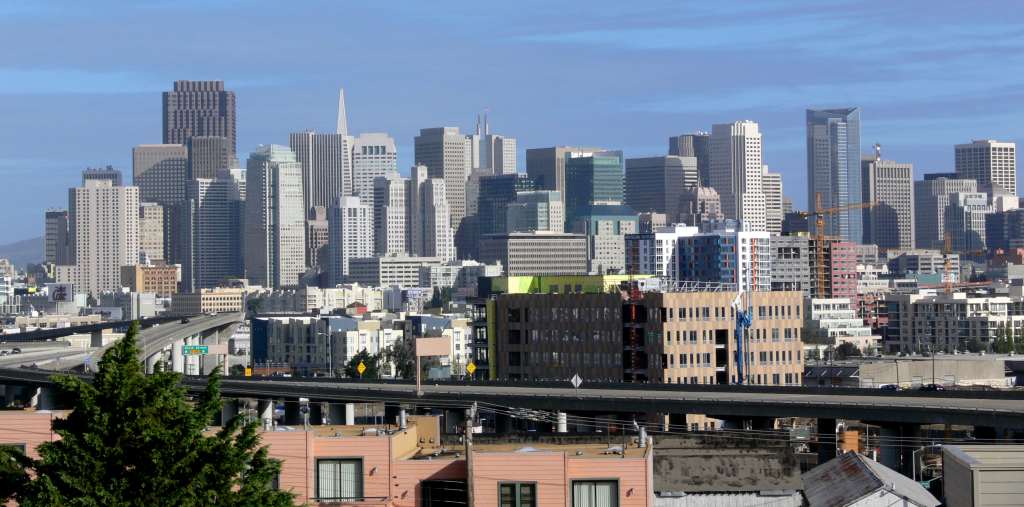
By Tim Redmond
SEPTEMBER 25, 2014 – In San Francisco, important political signals often lurk in the shadows. Powerful interests don’t come out and announce what they’re planning; you have to watch for the flickers of stories, the hidden indications of what the real agendas are.
And we’re starting to see lots of signs that there’s a move afoot to repeal or undermine Proposition M, the most important land-use legislation in modern San Francisco history, the 1986 ballot measure that put a cap on downtown office development and saved us from the boom-and-bust cycle that devastated other cities in the 1990s.
Prop. M was a reaction to decades of overdevelopment: Since the 1970s, a succession of mayors and supervisors had approved more than 30 million square feet of new office space, attracting tens of thousands of new workers and overwhelming the city’s transportation, housing, and budget infrastructure.
The measure put a modest (850,000 square feet a year) cap on new office construction, and put into the city’s planning codes a set of priority policies that promoted the protection of affordable housing and neighborhood character.
Since then, generations of planning commissions have ignored the Prop. M priority policies, but the annual limit is pretty inviolable. And it’s been a great thing for the local economy.
In the real-estate bust of the early 1990s, when an excess of speculative venture capital from recently deregulated savings and loan institutions drove a crazytime office-development boom, Houston almost went under. Other cities that had hitched their future to buildings that would never be occupied faced a financial crisis.
San Francisco was hit by the recession, too – but not as badly. See, Prop. M had forced reluctant planners and officials to protect a more diversified economy; when finance, insurance and real estate tanked, there was still a light-industrial, nonprofit, health-care and hospitality industry in town.
And after the bust, office development slowed. For several years, there were no new proposals at all. The recent construction boom has been mostly residential; that’s where the international capital sees the greatest return.
And since Prop. M is cumulative, the limit carries over from year to year. No projects this year? You get twice as much next year. There’s been so much carryover that we were never even close to the limit.
Until now.
The limit, of course, is not a bad thing: If you only allow one or two big projects a year, then the developers have to compete for approvals and show the city what they are willing to offer. More affordable housing, better design, contributions to transit – all those things are on the table in what we used to call a “beauty contest.”
But developers hate to compete, because that means offering amenities that eat up a slice of profit. So now that it appears the tech boom (yes, another boom that will eventually go bust) is driving demand for more offices, the (quiet) campaign is on to gut Prop. M.
I’ve been hearing about it for months. All over town, developers and tech promoters are complaining that the law is stifling their growth. Neighborhood and environmental leaders are starting to gear up for what they fear will be a brutal battle.
Now it’s starting to come into the open. The Business Times reported this week that developers are hoping they can get the mayor to open a series of loopholes in the law.
The cap, which was approved as Prop. M by voters in the mid-1980s, is a mounting worry in the real estate community, which is warning that restricting the amount of office space that gets built will drive rents even higher in the future.
But a fix to the Prop. M mess may be in the works. City planners and the city attorney’s office are researching whether they can add to the cap through a reinterpretation of the law — without going back to voters, as a broader change to Prop M would require. One idea is to give credit for office buildings that were eventually converted to housing or hotels. …
Mayor Ed Lee suggested at the San Francisco Business Times breakfast Wednesday that he was working on a plan to tackle Prop. M.
“I know you have Prop. M on your mind,” he said, later adding that “we need to be thoughtful in our approach,” and that might include looking at the conversion issue.
What’s not being said in these discussions is that the city needs more than new tech office space – and that office space competes with, and displaces, the other types of uses that help the city survive economic gyrations.
I remember when everyone insisted that we needed vast new amounts of office space – and then much of it sat empty for years, while small, locally owned, independent businesses were the only ones creating new jobs.
But so many of the people pulling the strings these days weren’t around, or weren’t paying attention, in 1990. They missed that history class. And they are ready to put the city back on track for another world-class bust.







